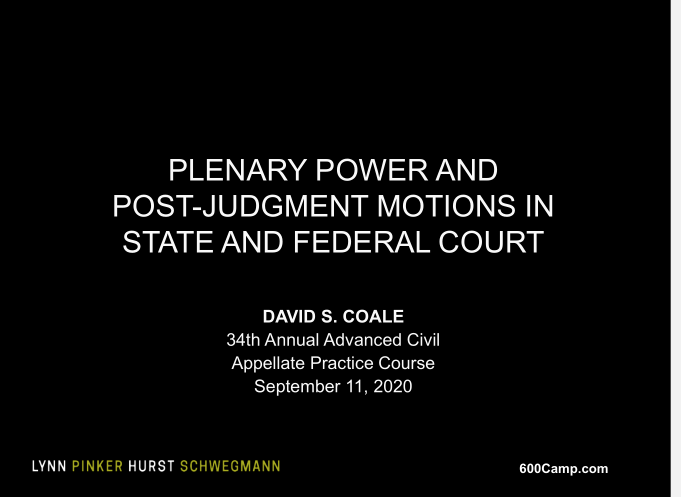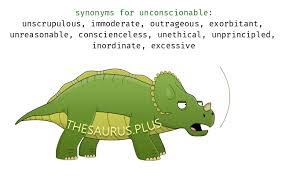 If the details of the virgule are not obscure enough for you, then you will love this wonderful article from Smithsonian Magazine about the “pilcrow,” a/k/a the paragraph symbol.
If the details of the virgule are not obscure enough for you, then you will love this wonderful article from Smithsonian Magazine about the “pilcrow,” a/k/a the paragraph symbol.
Monthly Archives: September 2020
 The Fifth Court found that ecclesiastical abstention barred a claim about expulsion from a private school: “Parents’ claims are premised on allegations that Prince of Peace failed to hire qualified staff and appropriately supervise its staff’s interactions with Students, including by failing to report suspected abuse of Students by its staff. Defense of these
The Fifth Court found that ecclesiastical abstention barred a claim about expulsion from a private school: “Parents’ claims are premised on allegations that Prince of Peace failed to hire qualified staff and appropriately supervise its staff’s interactions with Students, including by failing to report suspected abuse of Students by its staff. Defense of these  claims rests on Prince of Peace’s internal and religiously-informed policies and code of conduct. Judicial resolution of the claims would thus require impermissible intrusion in Prince of Peace’s management of these matters.” In re Prince of Peace Christian School, No. 05-20-00680-CV (Sept. 23, 2020) (mem. op.).
claims rests on Prince of Peace’s internal and religiously-informed policies and code of conduct. Judicial resolution of the claims would thus require impermissible intrusion in Prince of Peace’s management of these matters.” In re Prince of Peace Christian School, No. 05-20-00680-CV (Sept. 23, 2020) (mem. op.).
 Adding to the Fifth Court’s thorough discussion of exactly what constitutes a “finding of fact” in In re AEJ, the Court recently reminded: “Though the parties’ appellate arguments describe oral ‘findings’ recited by the trial court, a trial
Adding to the Fifth Court’s thorough discussion of exactly what constitutes a “finding of fact” in In re AEJ, the Court recently reminded: “Though the parties’ appellate arguments describe oral ‘findings’ recited by the trial court, a trial
court’s oral statements from the bench do not generally constitute findings of fact. ‘Statements made by a trial court outside of properly filed written
findings and conclusions do not limit an appellate court’s review.’” WorldVentures Marketing v. Travel to Freedom, No. 05-20-00169-CV (Sept. 23, 2020) (mem. op.) (citations omitted).
 If arguing that the plaintiff’s pleadings judicially admit arbitrability, be sure the record all lines up: “[T[]o the extent WorldVentures seeks to rely on a ‘judicial admission’ that TTF ‘consented to the 2019 agreements,’ the record does not show that the section 7.1 quoted in TTF’s petition necessarily came from the 2019 documents. The petition is silent as to what version of WorldVentures’ Policies & Procedures the quotation is from. Although the quoted section does not appear in the 2011 version, there were at least six additional versions in effect between 2012 and 2019. The record includes only the arbitration provision portions of those documents and does not show whether the quoted section 7.1 was unique to the 2019 version. Thus, the petition does not contain a ‘clear, deliberate, and unequivocal” statement of fact regarding consent to the 2019 agreements.'” WorldVentures Marketing v. Travel to Freedom, No. 05-20-00169-CV (Sept. 23, 2020) (mem. op.).
If arguing that the plaintiff’s pleadings judicially admit arbitrability, be sure the record all lines up: “[T[]o the extent WorldVentures seeks to rely on a ‘judicial admission’ that TTF ‘consented to the 2019 agreements,’ the record does not show that the section 7.1 quoted in TTF’s petition necessarily came from the 2019 documents. The petition is silent as to what version of WorldVentures’ Policies & Procedures the quotation is from. Although the quoted section does not appear in the 2011 version, there were at least six additional versions in effect between 2012 and 2019. The record includes only the arbitration provision portions of those documents and does not show whether the quoted section 7.1 was unique to the 2019 version. Thus, the petition does not contain a ‘clear, deliberate, and unequivocal” statement of fact regarding consent to the 2019 agreements.'” WorldVentures Marketing v. Travel to Freedom, No. 05-20-00169-CV (Sept. 23, 2020) (mem. op.).
 Cornwell v. Scothorn, discussed yesterday, also addressed whether quasi-estoppel could be a defense to a claimed breach of fiduciary duty. The Fifth Court affirmed on the basis of the charge submitted while also finding legally-sufficient evidence of reliance–the element that distinguishes “quasi-estoppel” from equitable estoppel. No. 05-18-00799-CV (Sept. 17, 2020) (mem. op.).
Cornwell v. Scothorn, discussed yesterday, also addressed whether quasi-estoppel could be a defense to a claimed breach of fiduciary duty. The Fifth Court affirmed on the basis of the charge submitted while also finding legally-sufficient evidence of reliance–the element that distinguishes “quasi-estoppel” from equitable estoppel. No. 05-18-00799-CV (Sept. 17, 2020) (mem. op.).
 Cornwell v. Scothorn addressed the interplay between the opposing sides’ fraud and promissory estoppel claim. It distinguished El Paso Healthcare System v. Piping Rock Corp., 939 S.W.2d 695 (Tex. App.—El Paso 1997, writ denied), as “address[ing] whether an unclean hands defense barred recovery on a promissory
Cornwell v. Scothorn addressed the interplay between the opposing sides’ fraud and promissory estoppel claim. It distinguished El Paso Healthcare System v. Piping Rock Corp., 939 S.W.2d 695 (Tex. App.—El Paso 1997, writ denied), as “address[ing] whether an unclean hands defense barred recovery on a promissory  estoppel claim. Piping Rock does not stand for the proposition that Stewart’s fraud in this case negated the Scothorns’ promissory estoppel claims. Ro the extent the jury found Stewart committed fraud and damaged McKinney $9427.86 in out-of-pocket damages and $8000 in damages for loss of credit reputation, we cannot conclude this finding precluded the jury from also finding that the Scothorns were entitled to damages of $201,318.04 on their promissory estoppel claim against Cornwell and McKinney.” No. 05-18-00799-CV (Sept. 17, 2020) (mem. op.).
estoppel claim. Piping Rock does not stand for the proposition that Stewart’s fraud in this case negated the Scothorns’ promissory estoppel claims. Ro the extent the jury found Stewart committed fraud and damaged McKinney $9427.86 in out-of-pocket damages and $8000 in damages for loss of credit reputation, we cannot conclude this finding precluded the jury from also finding that the Scothorns were entitled to damages of $201,318.04 on their promissory estoppel claim against Cornwell and McKinney.” No. 05-18-00799-CV (Sept. 17, 2020) (mem. op.).
 Tom Tillotson sought to appeal two turnover orders without posting a supersedeas bond. (The Fifth Court’s opinion reminds: “A turnover order in the nature of a mandatory injunction is a final judgment that may be superseded.”) The Court agreed with him that “the amounts [in the relevant accounts] do not constitute compensatory damages,” but disagreed as to the effect of that conclusion. Because the turnover order “functions as a mandatory injunction,” it “constitutes a judgment for something other than money or an interest in property and, accordingly [Tex. R. App. P.] 24.2(a)(3) controls” rather than Rule 24.2(a)(1) about the appeal of money judgments. “Under rule 24.2(a)(3), the trial court must set a bond that will adequately protect the judgment creditor against loss or damage that the appeal might cause.” In re Estate of Tillotson, No. 05-20-00258-CV (Sept. 15, 2020) (mem. op.)
Tom Tillotson sought to appeal two turnover orders without posting a supersedeas bond. (The Fifth Court’s opinion reminds: “A turnover order in the nature of a mandatory injunction is a final judgment that may be superseded.”) The Court agreed with him that “the amounts [in the relevant accounts] do not constitute compensatory damages,” but disagreed as to the effect of that conclusion. Because the turnover order “functions as a mandatory injunction,” it “constitutes a judgment for something other than money or an interest in property and, accordingly [Tex. R. App. P.] 24.2(a)(3) controls” rather than Rule 24.2(a)(1) about the appeal of money judgments. “Under rule 24.2(a)(3), the trial court must set a bond that will adequately protect the judgment creditor against loss or damage that the appeal might cause.” In re Estate of Tillotson, No. 05-20-00258-CV (Sept. 15, 2020) (mem. op.)
 Last week I spoke (virtually) at the State Bar’s Advanced Civil Appellate Course. My topic was post-verdict motions in state in federal court; here is a copy of my PowerPoint.
Last week I spoke (virtually) at the State Bar’s Advanced Civil Appellate Course. My topic was post-verdict motions in state in federal court; here is a copy of my PowerPoint.
 Recall from a a recent post that the Fifth Court has recognized the COVID-19 pandemic as a factor to consider in evaluating motions for continuance. That same opinion reminds that trial courts have substantial discretion to conduct virtual trials in an appropriate case:
Recall from a a recent post that the Fifth Court has recognized the COVID-19 pandemic as a factor to consider in evaluating motions for continuance. That same opinion reminds that trial courts have substantial discretion to conduct virtual trials in an appropriate case:
We also hold that the trial court did not abuse its discretion by overruling Relator’s objection to trial via videoconference. In its emergency orders, the supreme court expressly granted trial courts the discretion, “subject only to constitutional limitations” and “without a participant’s consent,” to require that all participants in hearings, depositions, “or other proceeding[s] of any kind” participate remotely, “such as by teleconferencing, videoconferencing, or other means.” Emergency Order 1, ¶ 2(b); Emergency Order 17, ¶ 3(c). Although the emergency orders do not specify bench trials, these would easily fall under the category of “other proceeding[s] of any kind.” Relator has not claimed that a bench trial by videoconference would violate any of his constitutional rights, so the trial court did not abuse its discretion in requiring Relator to participate in this manner.
(citations omitted).
 Orange Cup Drive In LLC v. Mid-Continent Casualty Co. illustrates the application of the rules about the grounds for summary judgment motions:
Orange Cup Drive In LLC v. Mid-Continent Casualty Co. illustrates the application of the rules about the grounds for summary judgment motions:
- General rule. “Granting summary judgment on a claim not addressed in the motion is, as a general rule, reversible error.’ The supreme court has recognized a harmless error exception to this rule “when the omitted cause of action is precluded as a matter of law by other grounds raised in the case.” (citations omitted).
- Insurance law. “[S]ome claims for common law or statutory violations may exist even where there is no coverage under the policy.”
 Thus: “Where the motion is silent on grounds for summary judgment for the extracontractual claims—and particularly where the motion specifically recites that the claims will be addressed by a separate motion later—we cannot determine whether ‘the omitted cause of action is precluded as a matter of law by other grounds raised in the case.'”
Thus: “Where the motion is silent on grounds for summary judgment for the extracontractual claims—and particularly where the motion specifically recites that the claims will be addressed by a separate motion later—we cannot determine whether ‘the omitted cause of action is precluded as a matter of law by other grounds raised in the case.'”
No. 05-19-00014-CV (Aug. 28, 2020) (mem. op.)
 The paternal-rights case of In re AEJ fully reviewed the somewhat-untidy law about Tex. R. Civ. P. 299 and its consequences, and made these observations and conclusions. As to the requirements of the rule:
The paternal-rights case of In re AEJ fully reviewed the somewhat-untidy law about Tex. R. Civ. P. 299 and its consequences, and made these observations and conclusions. As to the requirements of the rule:
- Tex. R. Civ. P. 299 says: “Findings of fact shall not be recited in a judgment. If there is a conflict between findings of fact recited in a judgment in violation of this rule and findings of fact made pursuant to Rules 297 and 298, the latter findings will control for appellate purposes. Findings of fact shall be filed with the clerk of the court as a document or documents separate and apart from the judgment.” (emphasis added);
- One line of Fifth Court cases holds “that findings in the body of a judgment ‘are inappropriate and may not be considered on appeal’.”;
- However, another line of Fifth Court cases says that “[b]ecause the record does not contain any additional findings of fact or conclusions of law, the findings in the
judgment have probative value and will be treated as valid findings.”
The Court found that on this record, the trial court made adequate findings in a memorandum ruling (observing, in a footnote, that the Court was not bound by the lable  placed on findings by the trial court). The Court also found no harm from any lack of findings, noting that the record and issues were well-defined and straightforward. It concluded with a practical observation: “And finally, in this case the remedy for a failure to make findings would be to abate the appeal and direct the trial judge to file findings on endangerment and best interest—presumably the very findings she has already made twice.” No. 05-20-00340-CV (Aug. 31, 2020).
placed on findings by the trial court). The Court also found no harm from any lack of findings, noting that the record and issues were well-defined and straightforward. It concluded with a practical observation: “And finally, in this case the remedy for a failure to make findings would be to abate the appeal and direct the trial judge to file findings on endangerment and best interest—presumably the very findings she has already made twice.” No. 05-20-00340-CV (Aug. 31, 2020).
The TCPA applied in Keel Recovery v. Tri County Adjusters because the suit was based on a police report–an act of petition. As to the prima facie case, the Fifth Court held:
“[W]hile Arion may have had a fiduciary duty to her employer, TCA, that does not mean she owed any fiduciary duty to Peters as owner of TCA. Arguably, to the extent Arion owed TCA a fiduciary duty, that duty was fulfilled by reporting Peters’ criminal activity that could subject TCA to negative consequences.”
No. 05-19-00686-CV (Sept. 4, 2020) (mem. op.).
 The trial court did not abuse its discretion in finding an arbitration agreement procedurally unconscionable when: “Herman testified in his affidavits that the meeting with appellant [law firm]’s employee was less than ten minutes. Herman made a brief statement to the employee explaining the accident, and the employee told Herman to sign a document. Herman asked the employee if the document was a contract, and the employee answered, ‘No, we are just gathering information,’ that the Daspit firm would review the facts, and that a lawyer would call him. The employee was ‘very impatient’ and told Herman ‘he could not stay to explain things.’ Herman also testified that when he signed the document, he ‘did not understand . . . that it contained an arbitration clause.’ Herman argues appellant’s employee did not permit Herman to read the arbitration provision before signing the document.” Daspit Law Firm v. Herman, No. 05-19-00615-CV (Aug. 25, 2020) (mem. op.)
The trial court did not abuse its discretion in finding an arbitration agreement procedurally unconscionable when: “Herman testified in his affidavits that the meeting with appellant [law firm]’s employee was less than ten minutes. Herman made a brief statement to the employee explaining the accident, and the employee told Herman to sign a document. Herman asked the employee if the document was a contract, and the employee answered, ‘No, we are just gathering information,’ that the Daspit firm would review the facts, and that a lawyer would call him. The employee was ‘very impatient’ and told Herman ‘he could not stay to explain things.’ Herman also testified that when he signed the document, he ‘did not understand . . . that it contained an arbitration clause.’ Herman argues appellant’s employee did not permit Herman to read the arbitration provision before signing the document.” Daspit Law Firm v. Herman, No. 05-19-00615-CV (Aug. 25, 2020) (mem. op.)
In a 1981 survey of family-court judges, D Magazine memorably quoted a lawyer: “If all judges were light bulbs, Judge Annette Stewart would be a floodlight – 200 watts . . . ” The first woman to serve as a Justice of the Fifth Court recently passed away. 